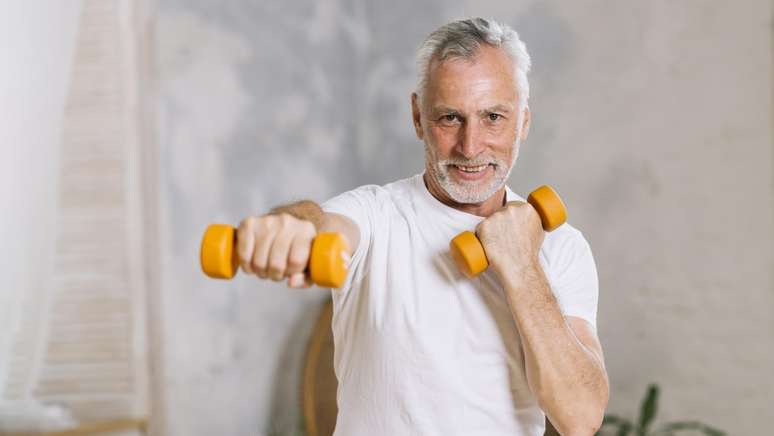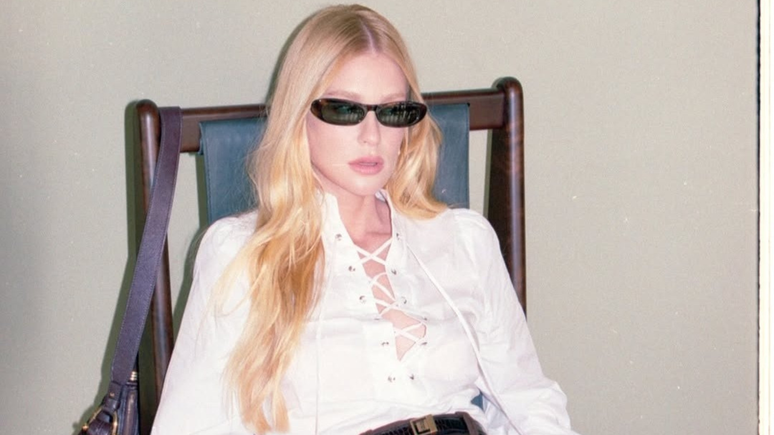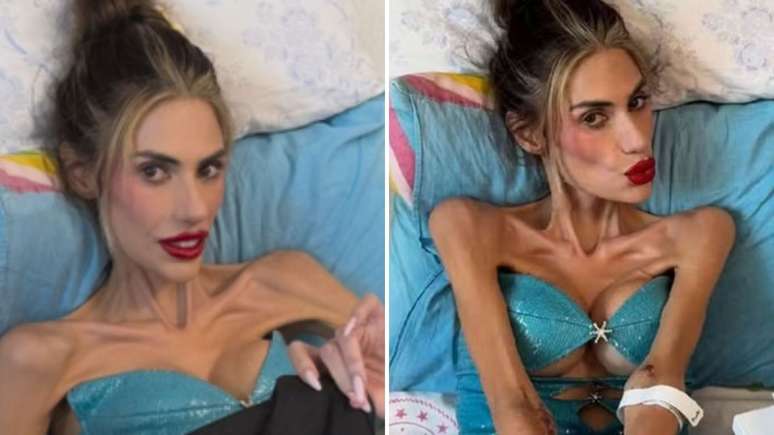The more intimate we become with ourselves, the more spaces we find to live better.
Monday, hands approaching 10pm, my mom comes home. Her intelligent arms remove the waterproof cover, splashed by the cold rain of Sao Paulo, revealing an electrified and melted body. Sitting at the kitchen table, I look at the proudly gray 72-year-old woman, brimming with life. She had just returned from a ballroom dance date.
In front of the freshly emptied plate and feeling groggy with laziness, I wonder and ask myself: where does the impetus come from for someone to move, especially on a soggy Monday, until their bones tremble? I feel that the answer will only manifest itself by digging behind the poetry which is the body itself. Not a set of bones, tissues and muscles that exhibits itself in a society seduced from different podiums, but which “in its power, vulnerability and originality affects the surrounding world as well as being the result of everything that has influenced and influences it in permanently”. , says the eutonist therapist Andréa Bomfim Perdigão, author of O Dentro eo Fora – Body (Patuá).
The body is a home
From time to time, we need someone to remind us that our primordial home is so much more than a prop brains awash with pragmatism in a world obsessed with results and flamboyance. We often ignore our persevering and merciful collection of memories, narratives, thoughts, feelings, sensations and knowledge that try to speak to us and signal us more honest and true paths.
Which, sadly, makes us strangers in our own home. “The body is like a house. Many people only observe it from the outside, but never manage to enter it”, observes the French physiotherapist Thérèse Bertherat, in the work The Body Has Its Reasons: Antigym and Self-Consciousness (WMF Martins Sources ).
While my mother recreates the most important moments of the dance with her body, I think that, as the thrill continues, she will be alive. I’m right. “What is alive moves. Movement is precisely the need to maintain and honor life, to renew it continuously”, Fernanda Cunha, creator of the yoga According to her, dance is “a new way of living that includes the movement of a body spontaneously and in connection with everything that surrounds it”.
One movement wakes up the other
Even Chinese Medicine attests to this torrent of life in benignly restless bodies, as it associates the impulse to move with the energy of wood, which in turn is linked to spring. We owe her the courage with which the sprout pierces the earth in search of the sky.
“It is about an aggressive energy in the sense of taking the first step, of having the strength to accomplish something. And it is also within us, it is what drives us to start and complete a project, to do physical activity, get out of bed, experience the day with your own hands and interact with the world”, observes Rafael Fernandes Soares, physical educator and integrative therapist, owner of Espaço Sadhana Danças e Terapias.
Thus, one movement awakens another and another until something in us changes and we are no longer the same as before. “As we move our bodies, we create new possibilities to exist and think about life in a creative and mobile way, perceiving it as a dance,” completes Fernanda.
What moves me?
But, for this, each person must be interested in their most sensitive and subtle layers, which, according to Soraya Jorge, who introduced the Authentic Movement in Brazil, can be combined with other activities more related to muscle strengthening and bone health, for example. As long as these choices are made by listening to you.
“It’s about empowering and legitimizing what I need or finding what I need in that moment,” she says. After decades dedicated to movement awareness at Angel Vianna Dance School, Rio de Janeiro, Soraya felt the need to enhance this work through the body approach she has been promoting for 25 years. “Authentic Movement is based on a relationship between motive and a witness without proposition or music. In this way, a field of trust is built so that the person can open up and surrender”, describes the researcher.
What do I want? More movement? Break? If nobody tells me what to do, what do I do with myself? These questions emerge during the meetings, leading to a deepening of the intimate experience of each participant, but always in relation to the other and to the outside. “The way I search for movement, how I am witnessed by someone, how I work with my judgments, how I talk about my experience, all this promotes a space for listening to oneself, for the legitimacy of my feeling, of my movement, my speech,” explains Soraya.
notice your body
You can also resonate with your body by asking it, in breaths of complicity, as if you were addressing a loved one: “Tell me: what do you need? What do you want? Food, rest, adventure, silence, caress, expansion ?”. This is a revolutionary, even subversive act. Because it implodes the logic according to which, in order to have value, one must “work” on the productivity scale for as long as possible, whatever the cost. When, indeed, all that nature most desires in us is to be nurtured and perpetuated With love.
“The body’s greatest desire and need is to be listened to and seen as a map. It never lies, because it has an ancestral wisdom that is cellular. For example, if you feel a weight in your body when faced with a job offer , get out of there, he knows where there is danger and where not”, warns Fernanda.
By perceiving ourselves in each moment, by seeking out what is pulsing powerfully within us now, we can weave another relationship with transience. Perhaps by replacing the demand for large enterprises with the enchantment of the simplest discoveries. “We are impermanent, and inhabiting the body comes from this place of recognizing small changes, of being able to legitimize them and authorize not only to live them, but to make an action out of them. What is the little new that appears today?”, Soraya asks.
consciousness in the flesh
Millennial traditions such as Chinese Medicine, Tantra and ayurvedic teach us that the body could never become a pre-programmed machine to generate records, because it is soma: physical, emotional, rational, energetic, spiritual. “That’s why bodywork reverberates in all of these cases, in everything that we are,” Rafael points out.
It’s not hard to notice this plot. Sometimes the mental ruminations are so overwhelming that the muscles respond by tensing, as if preparing for an upcoming brutal fight. But then we reverse that flow and let go of the body, moving it in the most pleasant or reassuring way we can at that moment. And then, after a while, we begin to be visited by comforting thoughts, true rescuers or prophets of a gentile future.
“Having more attention to our bodily and emotional states is the key to clearly seeing the way we interpret the world and respond to it. In this way we have more conditions to rebalance ourselves,” says the educator and therapist.
Our body is generous
See how the body, in addition to being malleable, is generous. Any physical activity can act as a meditation in movement. Everything will depend on the quality of our presence as we move. “The mind stops paying attention to several other simultaneous stimuli and focuses on the present, stopping the dispersion of energy,” explains Rafael. Blending body and energy therapy techniques with dance instruction for couples, he also conveys the ability for practitioners to learn about their strengths and shadows, dissolve bodily and emotional blockages, and refine their relationship with the other.
“Perceiving what that movement reverberates in our subtle field helps us to have a more aware life in everything,” confirms Fernanda. From the re-encounter with the body in motion and with everything that moves in it – from excruciating pain to the joy of feeling alive -, the trust of an adept of the Authentic Movement is born who has experienced, for the first time, the embodied sensation of what what compassion is. Spirituality impregnated with the body, e the body wise spirit.
“We are a passageway,” Soraya poetizes, helping us hear another woman’s story. A mother who, after losing her son, withdrew into herself. “Movement is a paradox, because movement and pause coexist, just like joy and sadness. They don’t fight as a duality.” Well, in a Yoga Dance practice, this woman absorbed the music with her body, and after being sequestered by time for a while, she felt the bud of her joy pierce her skin in search of the sun.
Text originally published in the magazine Vida Simples (Edition 249).
By Raffaela de Campos Mello
+The best content in your email for free. Choose your favorite Terra newsletter. Click here!
Source: Terra
Ben Stock is a lifestyle journalist and author at Gossipify. He writes about topics such as health, wellness, travel, food and home decor. He provides practical advice and inspiration to improve well-being, keeps readers up to date with latest lifestyle news and trends, known for his engaging writing style, in-depth analysis and unique perspectives.








